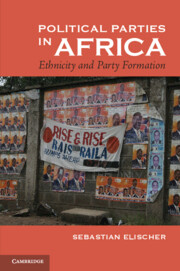Book contents
- Frontmatter
- Dedication
- Contents
- Tables
- Abstract
- Acknowledgments
- 1 Comparative Politics and Political Parties in Africa
- 2 A New Framework of Comparison for Political Parties
- 3 Kenya: The Ubiquity of Ethnic Parties
- 4 Namibia: The Dominance of Nonethnic Parties
- 5 Ghana: The Ubiquity of Nonethnic Parties
- 6 The Diversity of African Party Politics
- 7 Explaining the Formation of Nonethnic Parties
- Conclusion
- Annex A Operationalization of Secondary Party Types
- Annex B The Standard MRG Coding Frame
- Annex C Number of Effective Programmatic Categories
- Annex D Summary of Party Nationalization Scores (PNS) and Party Divergence Scores (PDS)
- Annex E Result for MRG Coding Scheme
- Annex F PNS Calculated on the Basis of Afrobarometer Data
- Annex G Scope of Party Systems Covered
- Annex H Party Nationalization Scores (PNS) of the Preliminary Cases
- Bibliography
- Index
4 - Namibia: The Dominance of Nonethnic Parties
Published online by Cambridge University Press: 05 June 2014
- Frontmatter
- Dedication
- Contents
- Tables
- Abstract
- Acknowledgments
- 1 Comparative Politics and Political Parties in Africa
- 2 A New Framework of Comparison for Political Parties
- 3 Kenya: The Ubiquity of Ethnic Parties
- 4 Namibia: The Dominance of Nonethnic Parties
- 5 Ghana: The Ubiquity of Nonethnic Parties
- 6 The Diversity of African Party Politics
- 7 Explaining the Formation of Nonethnic Parties
- Conclusion
- Annex A Operationalization of Secondary Party Types
- Annex B The Standard MRG Coding Frame
- Annex C Number of Effective Programmatic Categories
- Annex D Summary of Party Nationalization Scores (PNS) and Party Divergence Scores (PDS)
- Annex E Result for MRG Coding Scheme
- Annex F PNS Calculated on the Basis of Afrobarometer Data
- Annex G Scope of Party Systems Covered
- Annex H Party Nationalization Scores (PNS) of the Preliminary Cases
- Bibliography
- Index
Summary
In Kenya, ethnicity is a major obstacle for the formation of stable political parties. All parties could be identified as ethnic parties. Kenya is representative of countries in which ethnic parties prevail. The Kenya case further confirmed that ethnic divisions can lead to the formation of ethnic parties. Ethnic parties in turn can have detrimental effects on state stability.
The case of Namibia demonstrates that nonethnic parties exist and endure in Africa. This chapter provides apt evidence that Namibia's dominant party, the South West African People's Organization (SWAPO), is the prototype of a catch-all party. For long, the Democratic Turnhalle Alliance (DTA) was the official parliamentary opposition party (1989–2005). The DTA is the prototype of a multiethnic alliance. The evolving dynamics of party competition in Namibia are particularly intriguing. The coexistence of an ethnic opposition does not cause the disintegration of the nonethnic party in government, as predicted by Horowitz (2000). Following the 2005 elections, the Congress of Democrats (CoD) managed to become the new official parliamentary position. The CoD is another example of a catch-all party. A mixed-party system thus transformed into a nonethnic party system. In Namibia, enduring party competition does not foster ethnic antagonism but leads to the rise of nonethnic parties.
- Type
- Chapter
- Information
- Political Parties in AfricaEthnicity and Party Formation, pp. 100 - 139Publisher: Cambridge University PressPrint publication year: 2013



